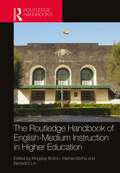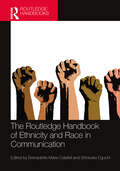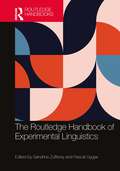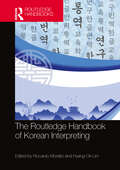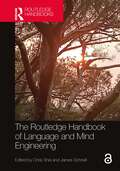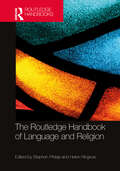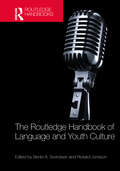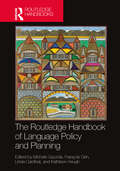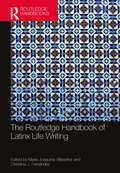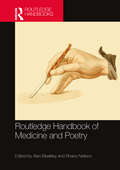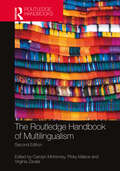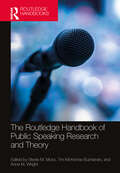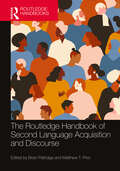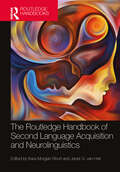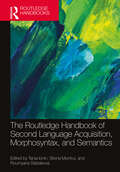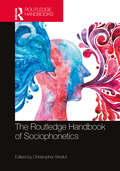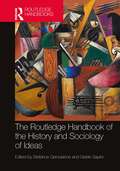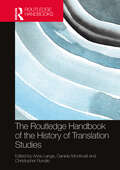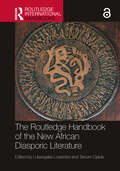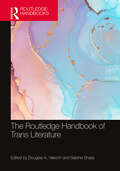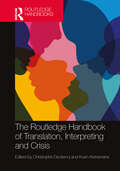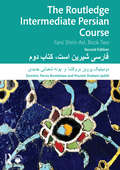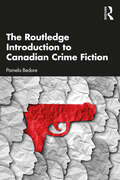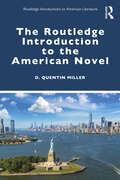- Table View
- List View
The Routledge Handbook of English-Medium Instruction in Higher Education (Routledge Handbooks in Linguistics)
by Kingsley Bolton Werner Botha Benedict LinThis Handbook discusses the theoretical and disciplinary background to the study of English-medium instruction (EMI) in higher education worldwide. It highlights issues relating to EMI pedagogy, varying motivations for EMI education, and the delivery of EMI in diverse contexts across the world. The spread of English as a teaching medium and the lingua franca of the academic world has been the subject of various debates in recent years on the perceived hegemony of the English language and the ‘domain loss’ of non-English languages in academic communication. Encompassing a wide range of contributions to the field of EMI, the chapters of this Handbook are arranged in four distinct parts: Part I provides an overview of English-medium instruction in higher education worldwide; Part II focusses on EMI in Europe; Part III on EMI in the Middle East, North Africa, and Sub-Saharan Africa; and Part IV on EMI in the Asian region. The overall scope and level of expertise of this Handbook provides an unrivalled overview of this field of education. It serves as an essential reference for many courses dealing with applied linguistics, English language education, multilingualism, sociolinguistics, and related subjects at many levels of education, including Master’s and PhD-level studies. This Handbook serves as a valuable edition for university libraries across the world and an essential read for many faculty, undergraduate and postgraduate students, educators, and policymakers.
The Routledge Handbook of Ethnicity and Race in Communication (Routledge Handbooks in Communication Studies)
by Bernadette Marie Calafell Shinsuke EguchiA much-needed text that takes stock of issues of ethnicity and race in communication studies, this book presents an overview of the most cutting-edge research, theory, and methods in the subject and advocates for centering ethnicity and race in the communication studies discipline. This handbook brings together a diverse group of both senior and up-and-coming scholars to offer original scholarship in race and ethnicity in communication studies, emphasizing various analytical perspectives including, but not limited to, global, transnational, diasporic, feminist, queer, trans, and disability approaches. While centering ethnicity and race, contributors also take an intersectional perspective in their approach to their topics and chapters. The book features examination of specific subfields, like Whiteness studies, Latina/o/x communication studies, Asian/Pacific American communication studies, African American communication and culture, and Middle East and North African communication studies. The text is oriented to graduate students and researchers within communication studies as well as media studies, cultural studies, critical race and ethnic studies, American studies, sociology, and education, while still being accessible to upper-level undergraduate students.
The Routledge Handbook of Experimental Linguistics (Routledge Handbooks in Linguistics)
by Sandrine Zufferey Pascal GygaxThe Routledge Handbook of Experimental Linguistics provides an up-to-date and accessible overview of various ways in which experiments are used across all domains of linguistics and surveys the range of state-of-the-art methods that can be applied to analyse the language of populations with a wide range of linguistic profiles. Each chapter provides a step-by-step introduction to theoretical and methodological challenges and critically presents a wide range of studies in various domains of experimental linguistics. This handbook: • Provides a unified perspective on the data, methods and findings stemming from all experimental research in linguistics • Covers many different subfields of linguistics, including argumentation theory, discourse studies and typology • Provides an introduction to classical as well as new methods to conduct experiments such as eye tracking and brain imaging • Features a range of internationally renowned academics • Shows how experimental research can be used to study populations with various linguistic profiles, including young children, people with linguistic impairments, older adults, language learners and bilingual speakers Providing readers with a wealth of theoretical and practical information in order to guide them in designing methodologically sound linguistic experiments, this handbook is essential reading for scholars and students researching in all areas of linguistics.
The Routledge Handbook of Intralingual Translation (Routledge Handbooks in Translation and Interpreting Studies)
by Linda Pillière Özlem Berk AlbachtenThe Routledge Handbook of Intralingual Translation provides the first comprehensive overview of intralingual translation, or the rewording or rewriting of a text. This handbook aims to examine intralingual translation from every possible angle. The introduction gives an overview of the theoretical, political, and ideological issues involved and is followed by the first section which investigates intralingual translation from a diachronic perspective covering the modernization of classical texts. Subsequent sections consider different dialects and registers and intralingual translation from one language mode to another, explore concepts such as self-translating, trans-editing, and the role of copyeditors and investigate the increasing interest in the role of intralingual translation and second language learning. Final sections examine recent developments in intralingual translation such as the subtitling of speech for the hard-of-hearing, simultaneous Easy Language interpreting or respeaking in parliamentary debates. By providing an in-depth study on intralingual translation, the Handbook sheds light on other important areas of translation that are often bypassed including publishing practices, authorship, and ideological constraints. Authored by a range of established and new voices in the field, this is the essential guide to intralingual translation for advanced students and researchers of translation studies.
The Routledge Handbook of Korean Interpreting (Routledge Handbooks in Translation and Interpreting Studies)
by Riccardo Moratto Hyang-Ok LimProfessor Riccardo Moratto and Professor Hyang-Ok Lim bring together the most authoritative voices on Korean interpreting. The first graduate school of interpretation and translation was established in 1979 in South Korea. Since then, not only has the interpretation and translation market grown exponentially, but so too has research in translation studies. Though the major portion of research focuses on translation, interpretation has not only managed to hold its own, but interpretation studies in Korea have been a pioneer in this field in Asia. This handbook highlights the main interpretation research trends in South Korea today, including case studies of remote interpreting during the Covid-19 pandemic, Korean interpreting for conferences, events, and diplomacy, and research into educating interpreters effectively. An essential resource for researchers in Korean interpreting, this handbook will also be very valuable to those working with other East Asian languages.
The Routledge Handbook of Language and Mind Engineering
by Chris Shei James SchnellThe Routledge Handbook of Language and Mind Engineering is a comprehensive work that delves into the complex interplay between language, culture, politics, and media in shaping the human mind.The book is divided into five main sections, each exploring different aspects of mind engineering: I. Political Mind Engineering; II. Commercial Mind Engineering; III. Media, Culture, and Mind Engineering; IV. Linguistic and Semiotic Analysis of Mind Engineering; V. Mind Engineering in Educational Settings.The book provides a multi-dimensional perspective on how language, media, culture, and politics intersect to shape individuals' thoughts and beliefs. It highlights the diverse methods and contexts in which mind engineering occurs, making it a valuable resource for scholars, researchers, and policymakers interested in understanding the complexities of contemporary discourse and manipulation of human thought.The contents of this cutting-edge handbook will engage all undergraduate, postgraduate, PhD students and scholars, and researchers at all levels, in fields such as languages, linguistics, politics, communication studies, media studies, and psychology.Chapter 15 of this book is freely available as a downloadable Open Access PDF at http://www.taylorfrancis.com under a Creative Commons Attribution (CC-BY) International license.Chapter 17 of this book is freely available as a downloadable Open Access PDF at http://www.taylorfrancis.com under a Creative Commons Attribution‑Non Commercial‑No Derivatives (CC‑BY‑NC‑ND) 4.0 license.Chapter 18 of this book is freely available as a downloadable Open Access PDF at http://www.taylorfrancis.com under a Creative Commons Attribution-Non Commercial-No Derivatives (CC-BY-NC-ND) 4.0 license.
The Routledge Handbook of Language and Religion (Routledge Handbooks in Linguistics)
by Stephen PihlajaThe Routledge Handbook of Language and Religion is the first ever comprehensive collection of research on religion and language, with over 35 authors from 15 countries, presenting a range of linguistic and discourse analytic research on religion and belief in different discourse contexts. The contributions show the importance of studying language and religion and for bringing together work in this area across sub-disciplines, languages, cultures, and geographical boundaries. The Handbook focuses on three major topics: Religious and Sacred Language, Institutional Discourse, and Religious Identity and Community. Scholars from a variety of different disciplinary backgrounds investigate these topics using a range of linguistic perspectives including Cognitive Linguistics, Discourse Analysis, Sociolinguistics, Pragmatics, and Conversation Analysis. The data analysed in these chapters come from a variety of religious backgrounds and national contexts. Linguistic data from all the major world religions are included, with sacred texts, conversational data, and institutional texts included for analysis. The Handbook is intended to be useful for readers from different subdisciplines within linguistics, but also to researchers working in other disciplines including philosophy, theology, and sociology. Each chapter gives both a template for research approaches and suggestions for future research and will inspire readers at every stage of their career.
The Routledge Handbook of Language and Youth Culture (Routledge Handbooks in Applied Linguistics)
by Bente A. Svendsen and Rickard JonssonThe Routledge Handbook of Language and Youth Culture offers the first essential grounding of critical youth studies within sociolinguistic research. Young people are often seen to be at the frontline of linguistic creativity and pioneering communicative technologies. Their linguistic practices are considered a primary means of exploring linguistic change as well as the role of language in social life, such as how language and identity, ideology and power intersect. Bringing together leading and cutting-edge perspectives from thought leaders across the globe, this handbook: • addresses how young people’s cultural practices, as well as forces like class, gender, ethnicity and race, influence language • considers emotions, affect, age and ageism, materiality, embodiment and the political youth, as well as processes of unmooring language and place • critically reflects on our understandings of terms such as ‘language’, ‘youth’ and ‘culture’, drawing on insights from youth studies to help contextualise age within power dynamics • features examples from a wide range of linguistic contexts such as social media and the classroom, as well as expressions such as graffiti, gestures and different musical genres including grime and hip-hop. Providing important insights into how young people think, feel, act, and communicate in the complexity of a polarised world, The Routledge Handbook of Language and Youth Culture is an invaluable resource for advanced students and researchers in disciplines including sociolinguistics, linguistic anthropology, multilingualism, youth studies and sociology.
The Routledge Handbook of Language Policy and Planning (Routledge Handbooks in Applied Linguistics)
by Michele Gazzola François Grin Linda Cardinal Kathleen HeughThe Routledge Handbook of Language Policy and Planning is a comprehensive and authoritative survey, including original contributions from leading senior scholars and rising stars to provide a basis for future research in language policy and planning in international, national, regional, and local contexts. The Handbook approaches language policy as public policy that can be studied through the policy cycle framework. It offers a systematic and research-informed view of actual processes and methods of design, implementation, and evaluation. With a substantial introduction, 38 chapters and an extensive bibliography, this Handbook is an indispensable resource for all decision makers, students, and researchers of language policy and planning within linguistics and cognate disciplines such as public policy, economics, political science, sociology, and education.
The Routledge Handbook of Latinx Life Writing (Routledge Literature Handbooks)
by Maria Joaquina VillaseñorThe Routledge Handbook of Latinx Life Writing provides an in‑depth introduction to Latinx life writing, taking a historical approach to the study of a variety of key Latinx life writers, genres, and thematic concerns. This volume includes chapters on fundamental genres of Latinx life writing including memoir, autobiography, oral history, testimonio, comics and graphic texts, poetry of protest, and theatre to more fully depict the breadth, dynamism, and vibrancy of Latinx life writing. Latinx people continuously engaged in the empowering act of telling their stories and narrating their lives, producing writing that at various times and in various ways expressed their joy, expressed their rage and anguish, and ultimately, asserted their subjectivity all the while indelibly contributing to the American literary landscape.
Routledge Handbook of Medicine and Poetry
by Alan Bleakley Shane NeilsonThe Routledge Handbook of Medicine and Poetry draws on an international selection of authors to ask what the cultures of poetry and medicine may gain from reciprocal critical engagement. The volume celebrates interdisciplinary inquiry, critique, and creative expansion with an emphasis upon amplifying provocative and marginalized voices.This carefully curated collection offers both historical context and future thinking from clinicians, poets, artists, humanities scholars, social scientists, and bio-scientists who collectively inquire into the nature of relationships between medicine and poetry. Importantly, these can be both productive and unproductive. How, for example, do poet-doctors reconcile the outwardly antithetical approaches of bio-scientific medicine and poetry in their daily work, where typically the former draws on technical language and associated thinking and the latter on metaphors? How does non-narrative lyrical poetry engage with narrative-based medicine? How do poets writing about medicine identify as patients? Central to the volume is the critical investigation of the consequences of varieties of medical pedagogy for clinical practice.Presenting a vision of how poetic thinking might form a medical ontology this thought-provoking book affords an essential resource for scholars and practitioners from across medicine, health and social care, medical education, the medical and health humanities, and literary studies.
The Routledge Handbook of Multilingualism (Routledge Handbooks in Applied Linguistics)
by Carolyn McKinney Pinky Makoe Virginia ZavalaThe Routledge Handbook of Multilingualism provides a comprehensive survey of the field of multilingualism for a global readership and an overview of the research which situates multilingualism in its social, cultural and political context. This fully revised edition not only updates several of the original chapters but introduces many new ones that enrich contemporary debates in the burgeoning field of multilingualism. With a decolonial perspective and including leading new and established contributors from different regions of the globe, the handbook offers a critical overview of the interdisciplinary field of multilingualism, providing a range of central themes, key debates and research sites for a global readership. Chapters address the profound epistemological and ontological challenges and shifts produced since the first edition in 2012. The handbook includes an introduction, five parts with 28 chapters and an afterword. The chapters are structured around sub-themes, such as Coloniality and Multilingualism, Concepts and Theories in Multilingualism, and Multilingualism and Education. This ground-breaking text is a crucial resource for researchers, scholars and postgraduate students interested in multilingualism from areas such as sociolinguistics, applied linguistics, anthropology and education.
The Routledge Handbook of Public Speaking Research and Theory (Routledge Handbooks in Communication Studies)
by Stevie M. Munz, Tim McKenna-Buchanan, and Anna M. WrightProviding a comprehensive survey of the empirical research, theory, and history of public speaking, this handbook fills a crucial gap in public speaking pedagogy resources and provides a foundation for future research and pedagogical development.Bringing together contributions from both up-and-coming and senior scholars in the field, this book offers a thorough examination of public speaking, guided by research across six key themes: the history of public speaking; the foundations of public speaking; issues of diversity, equity, and inclusion; considerations of public speaking across contexts; assessment of public speaking; and the future of public speaking in the twenty-first century. The evidence-based chapters engage with a broad discussion of public speaking through a variety of viewpoints to demonstrate how subtopics are connected and fraught with complexity. Contributors explore public speaking in education, business and professional settings, and political contexts, and outline how skills learned through public speaking are applicable to interpersonal, small group, and business interactions.Reinforcing the relevance, importance, and significance of public speaking in individual, interpersonal, social, and cultural communication contexts, this accessibly written handbook will be an indispensable resource for public speaking instructors and program administrators. It will also be valuable reading for Communication Pedagogy and Introduction to Graduate Studies courses.
The Routledge Handbook of Second Language Acquisition and Discourse (The Routledge Handbooks in Second Language Acquisition)
by Brian Paltridge Matthew T. PriorThis state-of-the-art volume offers a comprehensive and accessible examination of perspectives within the field of discourse analysis on the processes and conditions of second language learning, teaching, and use.Led by Brian Paltridge and Matthew T. Prior, this collection brings together leading global researchers in the field to guide readers through background theories, theoretical paradigms, methodological issues, and pedagogical implications by synthesizing current and past work, and setting a future agenda for discourse-oriented second language research.The book is a critical resource which will be indispensable for scholars and advanced students of applied linguistics, second language acquisition, education, and related fields.
The Routledge Handbook of Second Language Acquisition and Neurolinguistics (Routledge Handbooks in Second Language Acquisition)
by Kara Morgan-Short van Hell, Janet G.The Routledge Handbook of Second Language Acquisition and Neurolinguistics provides a comprehensive discussion of a wide range of neurocognitive and neurobiological scientific research about learning second or additional languages. It is a one-of-a-kind centralized resource that brings together research that is typically found in disperse publication venues. Eminent global scholars from various disciplines synthesize and cross-fertilize current and past neural research about second language through systematic, in-depth, and timely chapters that discuss cores issues for understanding the neurocognition of second language learning, representation, and processing. Handbook sections provide overviews of extant and emerging neuroscience methods, syntheses of neurocognitive research on second language syntax, morphosyntax, lexicon, phonology, and pragmatics, and up-to-date descriptions of theoretical approaches of the neural basis of second language learning. The volume provides additional sections that synthesize research on a variety of topics including factors that affect the neurocognition of second language, the neural mechanisms underlying second language learning, individual differences in the neurocognition of second language, as well as research on understudied languages and populations, such as sign language, child second language learners, and individuals with aphasia. This handbook will be an indispensable resource to scholars and students across a wide range of disciplines, including those interested in second language acquisition, applied linguistics, cognitive science, psychology, neuroscience, and research methodology. It should facilitate transformative connections between ideas and disciplines and lead to informative and productive paths for future research.
The Routledge Handbook of Second Language Acquisition, Morphosyntax, and Semantics (The Routledge Handbooks in Second Language Acquisition)
by Tania Ionin, Silvina Montrul, and Roumyana SlabakovaThis handbook provides innovative and comprehensive coverage of research on the second language acquisition (SLA) of morphosyntax, semantics, and the interface between the two.Organized by grammatical topic, the chapters are written by experts from formal and functional perspectives in the SLA of morphosyntax and semantics, providing in-depth yet accessible coverage of these areas. All chapters highlight the theoretical underpinnings of much work in SLA and their links to theoretical syntax and semantics; making comparisons to other populations, including child language acquirers, bilinguals, and heritage speakers (links to first language acquisition and bilingualism); dedicating a portion of each chapter to the research methods used to investigate the linguistic phenomenon in question (links to psycholinguistics and experimental linguistics); and, where relevant, including intervention studies on the phenomenon in question (links to applied linguistics).The volume will be indispensable to SLA researchers and students who work on any aspect of the SLA of morphosyntax or semantics. With its coverage of a variety of methodologies and comparisons to other populations (such as child language acquirers, early bilinguals, heritage speakers, and monolingual adults), the handbook is expected to also be of much interest to linguists who work in psycholinguistics, first language acquisition, and bilingualism.
The Routledge Handbook of Sociophonetics (Routledge Handbooks in Linguistics)
by Christopher StrellufThe Routledge Handbook of Sociophonetics is the definitive guide to sociophonetics. Offering a practical and accessible survey of an unparalleled range of theoretical and methodological perspectives, this is the first handbook devoted to sociophonetic research and applications of sociophonetics within and beyond linguistics. It defines what sociophonetics is as a field and offers views of what sociophonetics might become. Split into three sections, this book: • examines the suprasegmental, segmental, and subsegmental units that sociophoneticians study; • reveals the ways that sociophoneticians create knowledge and solve problems across a range of theoretical and practical applications; • explores sociophonetic traditions around the world in spoken and signed languages; • includes case studies that demonstrate sociophonetic research in action, which will support and inspire readers to conduct their own projects. This handbook is an indispensable resource for researchers, undergraduate and graduate students in sociophonetics, as well as researchers and students in sociolinguistics, phonetics, phonology, language variation and change, cognitive linguistics, psycholinguistics, speech pathology, and language teaching—and indeed any area of study where phonetics and phonology interact with social factors and forces.
The Routledge Handbook of the History and Sociology of Ideas
by Stefanos GeroulanosThe Routledge Handbook of the History and Sociology of Ideas establishes a new and comprehensive way of working in the history and sociology of ideas, in order to obviate several longstanding gaps that have prevented a fruitful interdisciplinary and international dialogues. Pushing global intellectual history forward, it uses methodological innovations in the history of concepts, gender history, imperial history, and history of normativity, many of which have emerged out of intellectual history in recent years, and it especially foregrounds the role of field theory for delimiting objects of study but also in studying transnational history and migration of persons and ideas. The chapters also explore how intellectual history crosses the study of particular domains: law, politics, economy, science, life sciences, social and human sciences, book history, literature, and emotions.
The Routledge Handbook of the History of Translation Studies (Routledge Handbooks in Translation and Interpreting Studies)
by Anne Lange Daniele Monticelli Christopher RundleThe Routledge Handbook of the History of Translation Studies is an exploration of the history of translation and interpreting studies (TIS) as a field of intellectual enquiry. The volume covers the evolution of thinking on translation, from the earliest discourses in Assyria, Egypt, Israel, China, India, Greece, and Rome, up to the early 20th century when TIS emerged as an identifiable academic field. The volume also traces the institutionalization of TIS and its key concepts from their beginnings in the 1920s in Ukraine up to their contemporary interdisciplinary manifestations. Written by leading international scholars, many of whom played a direct role in the events they describe, the chapters in this volume provide a comprehensive and in-depth account of the birth and consolidation of translation and interpreting studies as a thriving interdiscipline. With a focus on providing readers with the methodological and theoretical tools they need to conduct research, as well as background in the historiography of TIS, this handbook is an indispensable resource for all students and researchers of translation and interpreting studies.
The Routledge Handbook of the New African Diasporic Literature (Routledge International Handbooks)
by Lokangaka Losambe Tanure OjaideThe Routledge Handbook of the New African Diasporic Literature introduces world literature readers to the transnational, multivocal writings of immigrant African authors. Covering works produced in Europe, North America, and elsewhere in the world, this book investigates three major aesthetic paradigms in African diasporic literature: the Sankofan wave (late 1960s–early 1990s); the Janusian wave (1990s–2020s); and the Offshoots of the New Arrivants (those born and growing up outside Africa).Written by well-established and emerging scholars of African and diasporic literatures from across the world, the chapters in the book cover the works of well-known and not-so-well-known Anglophone, Francophone, and Lusophone writers from different theoretical positionalities and critical approaches, pointing out the unique innovative artistic qualities of this major subgenre of African literature. The focus on the “diasporic consciousness” of the writers and their works sets this handbook apart from others that solely emphasize migration, which is more of a process than the community of settled African people involved in the dynamic acts of living reflected in diasporic writings.This book will appeal to researchers and students from across the fields of Literature, Diaspora Studies, African Studies, Migration Studies, and Postcolonial Studies.
The Routledge Handbook of Trans Literature (Routledge Literature Handbooks)
by Douglas A. Vakoch Sabine SharpThe Routledge Handbook of Trans Literature examines the intersection of transgender studies and literary studies, bringing together essays from global experts in the field. This volume provides a comprehensive overview of trans literature, highlighting the core topics, genres, and periods important for scholarship now and in the future.Covering the main approaches and key literary genres of the area, this volume includes: Examination of the core topics guiding contemporary trans literary theory and criticism, including the Anthropocene, archival speculation, activism, BDSM, Black studies, critical plant studies, culture, diaspora, disability, ethnocentrism, home, inclusion, monstrosity, nondualist philosophies, nonlinearity, paradox, pedagogy, performativity, poetics, religion, suspense, temporality, visibility, and water. Exploration of diverse literary genres, forms, and periods through a trans lens, such as archival fiction, artificial intelligence narratives, autobiography, climate fiction, comics, creative writing, diaspora fiction, drama, fan fiction, gothic fiction, historical fiction, manga, medieval literature, minor literature, modernist literature, mystery and detective fiction, nature writing, poetry, postcolonial literature, radical literature, realist fiction, Renaissance literature, Romantic literature, science fiction, travel writing, utopian literature, Victorian literature, and young adult literature. This comprehensive volume will be of great interest to scholars and students of literature, gender studies, trans studies, literary theory, and literary criticism.
The Routledge Handbook of Translation, Interpreting and Crisis (Routledge Handbooks in Translation and Interpreting Studies)
by Christophe Declercq Koen KerremansThis handbook offers a broad-ranging overview of the study of translating and interpreting in conflict and crisis settings and takes the field in new directions. Covering a wide selection of multimodal contexts that build on the fundamentals of translation, interpreting, and their in-between hybrid forms of mediation, the handbook is divided into four parts. The opening part covers perspectives on policy and practices, whether contemporary or historical, and cases truly span the globe, from Peru and Brazil, over Belgium and Sierra Leone, to Australia, Japan, and Hong Kong. International developments require profound considerations about the professionalisation of access to language in times of crises, not least in contexts of humanitarian negotiation or conflict zone interpreting–these form the second part. The subsequent part deals with spheres of community in which language needs are positioned within frames of agency, positionality, and trust, and the challenges that these face. The contributions build on cases where interpreters act as catalysts for translation needs in settings of humanitarian aid and beyond. The final part considers language strategies and solutions in crises. This handbook is the essential guide to translation and interpreting in conflict and crisis settings for advanced students and researchers of translation and interpreting studies and will be of wide interest in peace studies, political science, and beyond.
The Routledge Intermediate Persian Course: Farsi Shirin Ast, Book Two
by Dominic Parviz Brookshaw Pouneh Shabani-JadidiThe Routledge Intermediate Persian Course, second edition, is an intermediate level Persian textbook written specifically for English-speaking university students that incorporates the guidelines of the American Council of Teaching Foreign Languages and those of the Common European Framework of Reference in its tasks and activities. The diversity of the texts in this textbook helps to familiarize students with a range of literary genres and provides them with the necessary building blocks to continue reading on their own. One of the distinctive features of this book is its content-based and task-based approach to learning the language; all the material provided has been carefully selected to support and enhance a student-centred class environment. In addition, all the texts are real texts and excerpts extracted from books published in Iran. As with The Routledge Introductory Persian Course , all the texts in this volume are available online in the form of audio files. These texts are recorded by native speakers and available for instructors and students to download freely at www.routledge.com/9781032319728. The Routledge Intermediate Persian Course: Farsi Shirin Ast, Book Two, second edition, follows on where the first textbook ends and is ideal for all intermediate learners of Persian in their second year of study.
The Routledge Introduction to Canadian Crime Fiction
by Pamela BedoreWho are the most important Canadian crime and detective writers? How do they help represent Canada as a nation? How do they distinguish Canada’s approach to questions of crime, detection, and social justice from those of other countries? The Routledge Introduction to Canadian Crime Fiction provides a much-needed investigation into how crime and detection have been, are, and will be represented within Canada’s national literature, with an attention to contemporary popular and literary texts. The book draws together a representative set of established Canadian authors who would appear in most courses on Canadian crime and detective fiction, while also introducing a few authors less established in the field. Ultimately, the book argues that crime fiction is a space of enormously productive hybridity that offers fresh new approaches to considering questions of national identity, gender, race, sexuality, and even genre.
The Routledge Introduction to the American Novel (Routledge Introductions to American Literature)
by D. Quentin MillerThe Routledge Introduction to the American Novel provides a comprehensive and engaging guide to this cornerstone literary genre, reframing our understanding of the American novel and its evolving traditions. This volume aims to engage productive classroom discussion, including: What differentiates the American novel from its European predecessors and traditions from other parts of the world? How have the related myths of the American Dream and the Great American Novel affected understanding of the tradition over time? How do American novels by or about women, racial and ethnic minorities, immigrants, and members of lower social classes challenge the American cultural monomyth? How do experimental novels and eco-conscious novels alter the American novel tradition? Rethinking historical trends and debates surrounding the American novel, this text delivers a persuasive case for why it’s important to reevaluate the American novelistic tradition. The Routledge Introduction to the American Novel offers a much-needed update to the history and future of this literary form.
